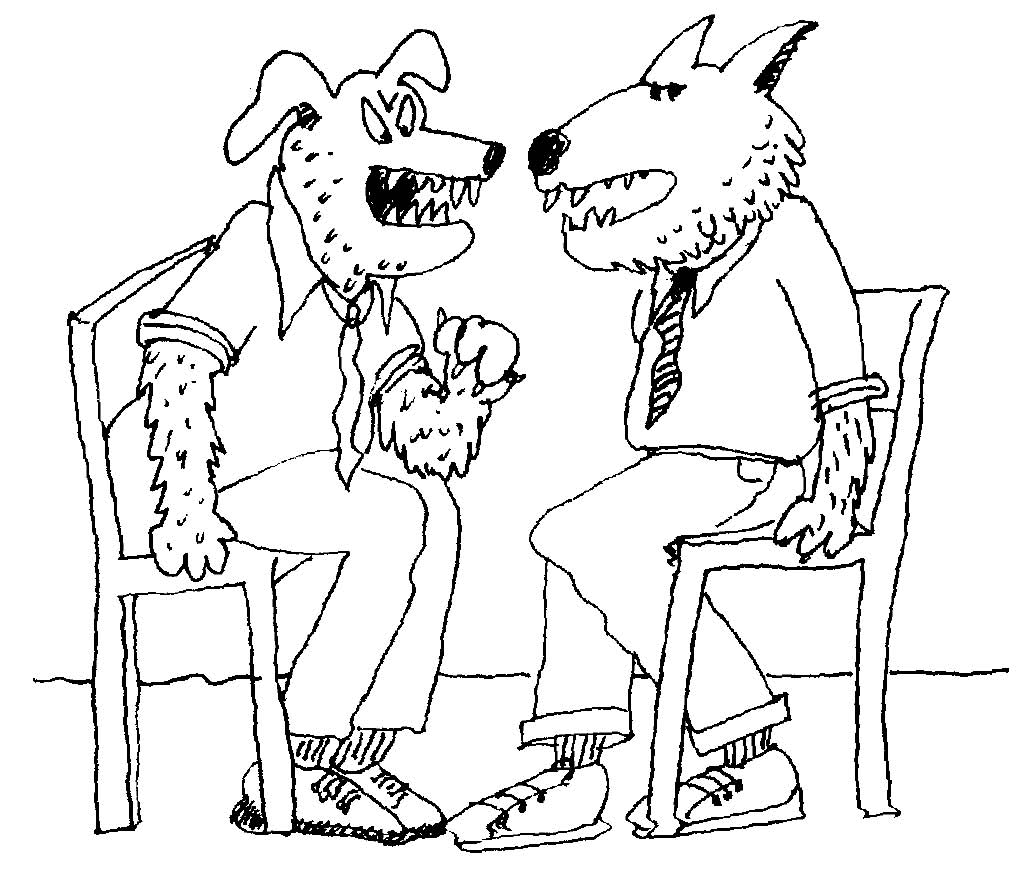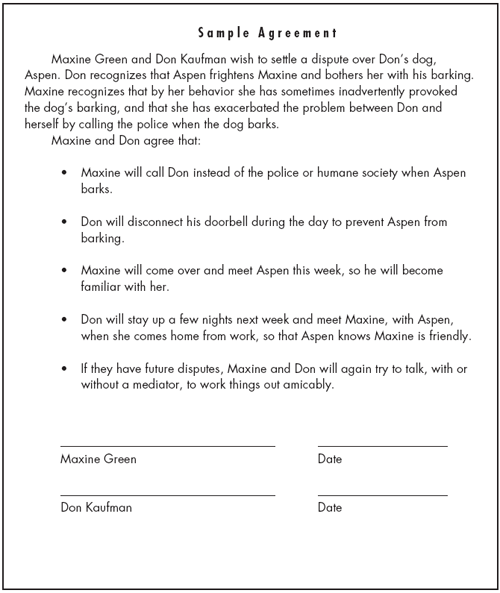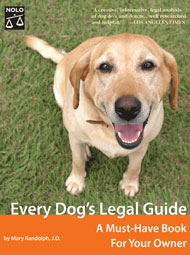Mediation: Getting Another Person to Help
If talking to your neighbor directly doesn't work, or you're convinced it's hopeless, consider getting some help from a mediator. A mediator won't make a decision for you, but will help you and your neighbor agree on a resolution of the problem.
Mediators, both professional and volunteers, are trained to listen to both sides, identify problems, keep everyone focused on the real problems, and suggest compromises. Going through the process helps both people feel they've been heard (a more constructive version of the satisfaction of "having your day in court") and often puts people on better terms.
Mediation provides a safe, structured way for neighbors to talk. They meet informally with one or more mediators, and first agree on ground rules - basic guidelines, such as no name-calling or interrupting. Then, each person briefly states a view of the problem. The mediator may summarize the problem and its history before moving on to discuss possible solutions.
The key to mediation is that unlike a lawsuit, it is not an adversarial process. You do not go to mediation to argue your side. No judge-like person makes a decision for you. So there is nothing to gain from the lying and manipulation common to the courtroom; the outcome is in the hands of the people who have the dispute. Until both agree, there is no resolution. People can become amazingly cooperative when they realize it's in their power - and no one else's - to resolve their problem.
A frequent consequence of mediation is that those involved in the dispute discover that the problem they think they have - a nuisance dog, for example - isn't the main problem at all. It may turn out that the reason one neighbor hasn't controlled her dog better is that she's upset about the other's plum tree, which drops messy fruit on her side of the fence. Mediation often brings out these hidden agendas. A neighbor who solves the tree problem by pruning a few overhanging branches may find that his neighbor suddenly finds a way to make her dog behave.
When two people do agree on how to alleviate the problem, it's best to put the agreement in writing. The goal is not to make it legally binding - the whole point of mediation is not to rely on some outside authority, like the courts, to make or enforce decisions. But writing down the agreement helps clarify everyone's expectations. And it's invaluable if later memories grow fuzzy, as they almost always do, about who agreed to do what. A sample agreement is shown later in this section.
Where to Find a Mediator
The best place to look for a free mediator for this kind of dispute is a community mediation group. Many cities - unfortunately, by no means all - have such groups, which usually train volunteers to mediate disputes in their own neighborhoods.
These volunteer mediators are likely to be familiar with dog disputes; Community Boards, a pioneering San Francisco program, estimates that about one in ten of its complaints involve pets. (A typical Community Boards mediation session is outlined below.)
Someone who doesn't have any formal training may make a fine mediator. For example, someone active in a neighborhood association, if neutral about the dispute and willing to stay neutral during mediation, might make a good amateur mediator. For that matter, anyone who's respected by the people involved in the dispute might be able to help. Someone who's lived in the area a long time may have some good ideas for solutions, but you'll never know unless you ask.
Here are some other places that may be able to refer you to a mediation service:
- the small claims court clerk's office
- the local district attorney's office - try the consumer complaint division, if there is one
- radio or television stations that offer help with consumer problems
- state or local bar associations. Many state bar associations publish directories of all local dispute resolution programs in the state.
Some people make a living as professional mediators. Many of them, however, specialize in some area, such as disputed divorces or child custody matters. Their fees may not be worth it to you unless your only alternative is the costly one of hiring a lawyer and going to court.
Mediating Dogfights
Here's an example, based on an actual dispute, of a typical mediation from Community Boards, a San Francisco organization of volunteer mediators.
Maxine called the SPCA and police because her neighbor's dog frightened her and woke her with its barking. The police suggested Community Boards. Don, the dog's owner, was anxious to stop what he considered Maxine's harassment and readily agreed to mediation. A Community Boards volunteer talked to Maxine and Don separately, wrote a short summary ("case report") outlining the problem, and scheduled a hearing.
At the hearing, after the introductions and preliminaries, one of the volunteer mediators read the case report. The problem was that Don's dog growled and barked at Maxine when she came home from work late each night, and woke her in the morning when it barked at anyone who rang the doorbell of Don's house. She called the SPCA because she thought the dog barked because it was being mistreated. She hadn't approached Don directly because she was afraid of the dog.
Don was upset and embarrassed by visits from police and letters from the SPCA. He'd had his dog, Aspen, for five years without any problems. He considered himself a responsible pet owner, and Aspen a good dog and a positive addition to the community.
Maxine was the first to give her opinion of the problem.
Maxine: "I'm so tired of all that barking and snarling! That dog is vicious, and he ought to be put away!"
Don: "Aspen serves as a watchdog, and in our neighborhood that's really needed. He only barks at strangers and unfriendly people like Maxine. He wouldn't need to bark if you didn't make those threatening gestures."
The mediators, Kate and Joe, step in to keep Maxine and Don, who are obviously angry and uncomfortable, talking civilly about the issues.
Joe: "We would like you to talk to each other about your conflict directly. Please turn your chairs to face each other."
Maxine: "I don't want to talk to him. Why can't you just tell him to get rid of the dog?"
Joe: "Our job is to help both of you reach your own solution. Please talk to Don directly."
Maxine: "Well, I don't think this will do any good. I can't talk to anyone who says I am harassing him. All I want is peace in my own home without being awakened or jumped on by a dangerous dog."
Don: "I really resent that! Aspen's not dangerous. He's just protecting his home. If you'd stop yelling at him, he wouldn't bark or jump at you."
Kate: "Maxine, you mentioned two noise problems, during the day while you're trying to sleep, and when you are home at night, right?"
Maxine: "The dog wakes me up around 9 or 10 in the morning. It seems like every morning … then I can't get back to sleep."
Don: "If those salesmen and religious fanatics and political freaks would stop ringing the doorbell and leaving their literature - that's why he barks. He's just protecting his home."
Maxine: "From what? Someone collecting signatures on a petition? Why does he throw himself against the fence and growl and show his teeth when I come from work? It scares me so much that some nights I don't even want to come home!"
Kate: "So Don's yard is right next to your front door?"
Maxine: "Yes. I let myself in along the side of the building, and that dog is always there in the yard. He growls while I'm trying to get my door unlocked. It's scary. I'm afraid he'll break the fence down and attack me."
Kate: "Don, can you repeat what Maxine just said?"
Don: "Yes, she said she was scared. But if she would take the time to meet Aspen, he wouldn't growl because he would know her."
Kate: "Would you tell Maxine that, please?"
Don: "You're afraid that Aspen will attack you."
Maxine: "Yes, I got bitten badly when I was growing up, and I'm afraid of dogs."
Don: "Aspen's very gentle. He doesn't ever bark at people he knows. Maybe if he got to know you, you would see that you don't need to be afraid of him."
Joe: "Don, please tell Maxine about having the police come to your home."
Don: "It's so embarrassing! I'm afraid that the landlady will find out and get mad, and make me move or get rid of Aspen. Also, I don't want my neighbors thinking I'm a drug dealer or something."
After some more discussion, the mediators began to help Maxine and Don clarify their progress.
Joe: "Maxine, do you understand Don's position now?"
Maxine: "I realize that Don's dog wasn't barking or threatening me on purpose. Also I know that he wants to be a good neighbor."
Don: "I realize now that Maxine was frightened of dogs because of her childhood experience and that she was really afraid Aspen would hurt her. Also, she called the police because she didn't think I would listen to her."
Kate: "Maxine, if the dog's noise bothers you again, what might you do differently?
Maxine: "I wouldn't call the police, at least not if I could talk to Don first."
Kate: "What about you, Don?"
Don: "I would try to take care of the noise problem, and try to make Maxine feel welcome in the neighborhood."
Next, the mediators helped Maxine and Don work together on a written resolution. One mediator read from the notes taken during the hearing, and suggested areas of agreement. Their agreement is shown below.


